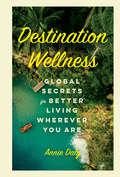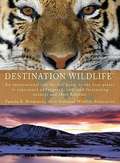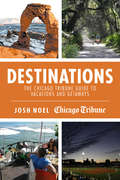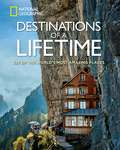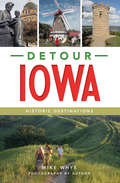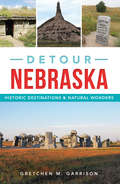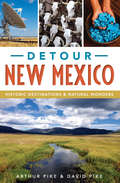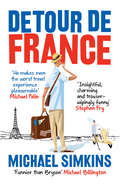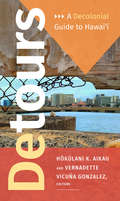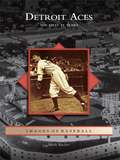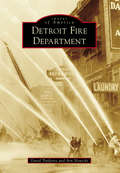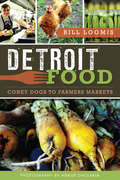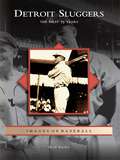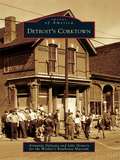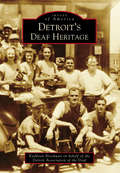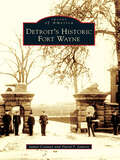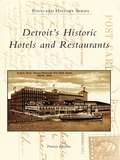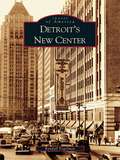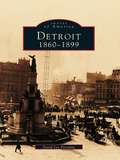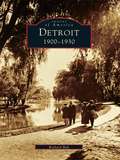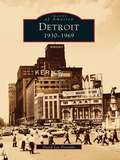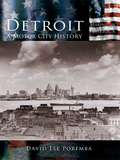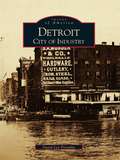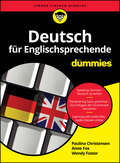- Table View
- List View
Destination Wellness: Global Secrets for Better Living Wherever You Are
by Annie DalyTrue well-being isnt hard to find. You just have to know where to look. In this insightful, full-color tour of Jamaica, Norway, Hawai'i, Japan, India, and Brazil, wellness and travel journalist Annie Daly shares a diverse array of philosophies, lifestyles, and practices for better living.Fed up with the commercialization of the wellness industry after working in it for years, Annie embarked on an inspiring adventure through some of the world's happiest and healthiest cities and villages to find out what we can learn from them. Whether she's hiking along gorgeous fjords in Norway to see why Norwegians are so dedicated to getting outside, soothing her spirit with Hawaiian salt water cleanses, or learning about the importance Brazilians place on community, Annie combines on-the-ground reporting with heartful personal narrative to share the global lessons, philosophies, and customs that prove that wellness is not about the products—it's about the way you live your life.With candid photography, lesser-known history sidebars, and guidance on how to incorporate these often ancient and always timeless practices into your own lifestyle, this culturally-immersive read invites you to view the world through a different lens and decide what being well means to you.Destination Wellness is the perfect book for:• Anyone who has embraced hygge and is looking for new lifestyle inspiration• Armchair travelers and staycationers• Happiness and inspiration seekers• Wellness and travel enthusiasts• History lovers
Destination Wildlife
by Brodowsky Pamela K1,001 animals to see before they die. From the world's only multi-species primate sanctuary in South Africa, to the wild ponies of Assateague Island, to the Blue-Footed Boobies of the Galapagos Islands, Destination Wildlife provides all the information the intrepid traveler looking for the best wildlife experiences could need-and rarely finds in other travel guides. Written from a visitor's perspective-and informed by the National Wildlife Federation and other naturalists- each site in Destination Wildlife has been evaluated by real eco-travelers who have provided insider tips and suggestions that give the what, when, where, how and- most important-the why of every site to maximize each wildlife experience.
Destinations
by Josh NoelDestinations is a helpful, insightful collection of columns from Chicago Tribune travel writer Josh Noel, covering a wide range of expertly curated getaways. Focusing mostly on US locations, but with beautiful international locales sprinkled in, Noel gives a critical and off-the-beaten path view of an eclectic group of vacation spots.Noel offers useful recommendations on weekend jaunts and week-long excursions, mixing in both affordable and ultra-luxurious options, including spas, skiing, Sundance, and the French Riviera. With options like microbrewery tours in Colorado and a Tibetan cultural center in Indiana, Noel uncovers what the average travel guide misses. Additionally, each article includes tips on hotels, restaurants, and travel arrangements.Whether readers are looking for a pleasant nature walk, rugged camping trip, or a city's top under-the-radar hotspots, Destinations is the perfect interactive travel guide.
Destinations of a Lifetime
by National GeographicNational Geographic takes you on a photographic tour of the world's most spectacular destinations, inspiring tangible ideas for your next trip. Hundreds of the most breathtaking locales--both natural and man-made--are illustrated with vivid images taken by the organization's world-class photographers. These images, coupled with evocative text, feature a plethora of visual wonders: ancient monoliths, scenic islands, stunning artwork, electric cityscapes, white-sand seashores, rain forests, ancient cobbled streets, and both classic and innovative architecture. Loaded with hard service information for each location, Destinations of a Lifetime has it all: when to go, where to eat, where to stay, and what to do to ensure the most enriching and authentic experience.From the Hardcover edition.
Destinations of a Lifetime: 225 of the World's Most Amazing Places
by National GeographicHundreds of oversized images of the world's most spectacular destinations are featured along with service information on the best and most authentic ways to experience them. A candy box full of visual delights, this book will inspire tangible ideas for everyone's next great trip. National Geographic takes you on a photographic tour of our world in this spellbinding new coffee table travel gift book. Hundreds of Earth's most breathtaking locales are illustrated with vivid, oversized full-color images taken by Nat Geo's world-class photographers. These images, coupled with evocative text, feature a plethora of visual wonders: ancient monoliths, scenic islands, stunning artwork, electric cityscapes, white-sand seashores, rain forests, ancient cobbled streets, and both classic and innovative architecture. Loaded with hard service information for each location, Destinations of a Lifetime has it all: when to go, where to eat, where to stay, and what to do to ensure the most enriching and authentic experience.
Detour Iowa: Historic Destinations
by Mike WhyeIowa history ranges from the natural to what's been made by humans over many centuries. Find and hold the fossilized remains of sea creatures that lived 375 million years ago. Walk through a small-town home where one of the nation's most infamous--and unsolved--murders occurred in 1912. Savor pastries that originated in the Netherlands before the 1840s and watch where wheat is ground into flour in a windmill first built in Denmark and then rebuilt in Elk Horn. Listen to time softly tick away in an elaborately carved clock that auto pioneer Henry Ford tried and failed to buy in 1928 for $1 million. Join writer-photographer Mike Whye on trips to the known, little-known and unknown historic places in Iowa.
Detour Nebraska: Historic Destinations & Natural Wonders
by Gretchen M. GarrisonFor many, Nebraska is the flat prairie seen from the interstate. Yet with the Sandhills, bluffs and river valleys, the state has an abundance of riches. The heritage of early settlers is evident. Fort Kearny and Chimney Rock were pioneer harbors. The Fur Trade Museum and the Homestead Monument of America tell of those who came to make a life. Carhenge is a nationally known treasure. The Joslyn Art Museum features world-class art, and the Nebraska National Forest is the largest hand-planted forest in the nation. Native Nebraskan Gretchen Garrison details the places and people that make the Cornhusker State unique.
Detour New Mexico: Historic Destinations & Natural Wonders
by Arthur Pike David PikeNew Mexico’s rich and varied history is easily accessible via detours down obscure backroads and overlooked off-ramps. By taking the road less traveled in any direction, visitors can experience ancient landmarks, cultural heritage sites and striking vistas. Stop at places along the old Route 66, sample the world’s best chiles by the Rio Grande or soak in geothermal water flowing under Truth or Consequences. Ancient dwellings in remote canyons, the town where the first atomic bomb was secretly assembled and the grave of Billy the Kid all lie off the beaten path in the Land of Enchantment. Authors Arthur and David Pike map out these and many more worthwhile points of interest for the curious traveler.
Detour de France: An Englishman in Search of a Continental Education
by Michael SimkinsThough happy enough with his lot, Michael Simkins has never truly shaken the nagging doubt - helpfully upheld by his partner Julia - that he somehow lacks worldly sophistication. While she spent her teenage years as a nanny on a boat moored at Cannes, his utter lack of travel experience (Weymouth, Cleethorpes and a day trip to Dieppe) still has the power to shock people into leaving dinner parties early.So as he hits middle-age, Michael takes up the challenge of broadening his horizons. He decides to improve himself in the same way English gentlemen lacking refined edges have for centuries: by learning from our more cultured French neighbours. Michael, an English provincial ingénue, sets off to discover just what the Gallic nation can teach him and the rest of us Anglo-Saxons about living the good life. Armed only with 50 Useful Phrases in French, he waits to see if his odyssey from La Manche to the Riviera will finally turn him from the scotch-egg eating spawn of Anne Widdecombe and John McCririck into the champagne-sipping love child of Serge Gainsbourg and Catherine Deneuve. Julia is saying a prayer for him at Lourdes.
Detours: A Decolonial Guide to Hawai'i
by Hokulani K. Aikau Vernadette Vicuna GonzalezMany people first encounter Hawai&‘i through the imagination—a postcard picture of hula girls, lu&‘aus, and plenty of sun, surf, and sea. While Hawai&‘i is indeed beautiful, Native Hawaiians struggle with the problems brought about by colonialism, military occupation, tourism, food insecurity, high costs of living, and climate change. In this brilliant reinvention of the travel guide, artists, activists, and scholars redirect readers from the fantasy of Hawai&‘i as a tropical paradise and tourist destination toward a multilayered and holistic engagement with Hawai&‘i's culture and complex history. The essays, stories, artworks, maps, and tour itineraries in Detours create decolonial narratives in ways that will forever change how readers think about and move throughout Hawai&‘i. Contributors. Hōkūlani K. Aikau, Malia Akutagawa, Adele Balderston, Kamanamaikalani Beamer, Ellen-Rae Cachola, Emily Cadiz, Iokepa Casumbal-Salazar, David A. Chang, Lianne Marie Leda Charlie, Greg Chun, Joy Lehuanani Enomoto, S. Joe Estores, Nicholas Kawelakai Farrant, Jessica Ka&‘ui Fu, Candace Fujikane, Linda H. L. Furuto, Sonny Ganaden, Cheryl Geslani, Vernadette Vicuña Gonzalez, Noelani Goodyear-Ka&‘ōpua, Tina Grandinetti, Craig Howes, Aurora Kagawa-Viviani, Noelle M. K. Y. Kahanu, Haley Kailiehu, Kyle Kajihiro, Halena Kapuni-Reynolds, Terrilee N. Kekoolani-Raymond, Kekuewa Kikiloi, William Kinney, Francesca Koethe, Karen K. Kosasa, N. Trisha Lagaso Goldberg, Kapulani Landgraf, Laura E. Lyons, David Uahikeaikalei&‘ohu Maile, Brandy Nālani McDougall, Davianna Pōmaika&‘i McGregor, Laurel Mei-Singh, P. Kalawai&‘a Moore, Summer Kaimalia Mullins-Ibrahim, Jordan Muratsuchi, Hanohano Naehu, Malia Nobrega-Olivera, Katrina-Ann R. Kapā&‘anaokalāokeola Nākoa Oliveira, Jamaica Heolimelekalani Osorio, No&‘eau Peralto, No&‘u Revilla, Kalaniua Ritte, Maya L. Kawailanaokeawaiki Saffery, Dean Itsuji Saranillio, Noenoe K. Silva, Ty P. Kāwika Tengan, Stephanie Nohelani Teves, Stan Tomita, Mehana Blaich Vaughan, Wendy Mapuana Waipā, Julie Warech
Detroit Aces: The First 75 Years (Images of Baseball)
by Mark RuckerEver since the city was granted its first major league team, the Wolverines in 1881, Detroit baseball fans have packed the parks to loyally cheer for their favorite hurlers on the mound. In 1887, Charlie Getzein, nicknamed "Pretzels," led the Detroit ball club to its first National League pennant with 29 wins. The rubber-armed "Wild" Bill Donovan led the Detroit Tigers to the city's first American League pennant in 1907, notching up an astounding .862 winning percentage despite a legendary lack of control. More great pitchers were to follow in the coming decades, and, written from the perspective of an old-time fan, Detroit Aces: The First 75 Years is a fun read for any Motor City baseball enthusiast.
Detroit Fire Department (Images of America)
by David Traiforos Arn NowickiOnce known as the "Paris of the West," Motown became synonymous with urban abandonment and arson as job and population decline took hold in the late 20th century. No other fire department has experienced the hardships of the job on such a consistent basis as the Detroit Fire Department (DFD). Detroit firefighters have ridden the waves of unprecedented prosperity and tragic decline. Determined faces mask many layoffs, station closings, and a reduction in workforce. Despite these perils, dedication and the belief in their city remains a constant among Detroit firefighters. The official Detroit motto, "We hope for better things; it shall rise from the ashes" holds as true today as it did when first uttered over 100 years ago.
Detroit Food: Coney Dogs to Farmers Markets (American Palate)
by Bill LoomisThe infamous images of Detroit's crumbling buildings, abandoned homes and weed-choked parks are known worldwide. Seldom shown are the city's thriving food ways, quietly rebuilding neighborhoods block by block with urban farms, locally made fare, new restaurants and an innovative, homegrown spirit that is attracting entrepreneurs and culinary enthusiasts from across the nation. Old neighborhoods are coming back to life with the smell of simmering soup, the crunch of new pickles and the aroma of all-day barbeque. Magnificent Art Deco clubs and speakeasies painstakingly restored to their former beauty are busy serving great local food. Author Bill Loomis goes behind the graffiti and ruins to explore how the passion for eating well is proving essential to Detroit's comeback..
Detroit Sluggers: The First 75 Years (Images of Baseball)
by Mark RuckerEver since the city was granted its fi rst major-league team, the Wolverines in 1881, Detroit baseball fans have packed the parks to loyally cheer for their favorite sluggers at the plate. Big Dan Brouthers helped the Detroit ball club win its first National League pennant with 12 home runs, 101 RBIs, and a league-leading 153 runs scored in 1887. Twenty years later, a rookie named Ty Cobb, at the start of a hall-of-fame career, led the league in batting and the Tigers to three successive American League pennants. Hank Greenberg, Rudy York, and Al Kaline joined the ranks of Motor City sluggers in the coming decades who thrilled fans with the long ball in pennant race after exciting pennant race. Written from the perspective of an old-time fan, Detroit Sluggers: The First 75 Years is a fun read for any Motor City baseball enthusiast.
Detroit's Corktown (Images of America)
by Armando Delicato Julie Demery Workman’s Rowhouse MuseumDetroit's Corktown celebrates the history of Detroit's oldest neighborhood. From Irish immigrants in the 1840s to urban pioneers of the 21st century, this community has beckoned to the restless of spirit, the adventurous, and those who have sought to escape poverty and oppression to make a new life in America. While the city of Detroit has undergone tremendous change over the years, Corktown has never forgotten the solid working-class roots established by brave pioneers in the mid-19th century. Many of their shotgun homes are still occupied, and many commercial buildings have served the community for decades. Today the neighborhood is the scene of increasing residential and commercial development and has attracted attention throughout the region. No longer exclusively Irish, the community has also been important historically to the large German, Maltese, and Mexican populations of Detroit. Today it is a diverse and proud community of African Americans, Hispanics, working-class people of various national origins, and a growing population of young urban pioneers. It is still the sentimental heart of the Irish American community of metropolitan Detroit, and the Irish Plaza on Sixth Street honors the city's Irish pioneers and their 600,000 descendents living in the region.
Detroit's Deaf Heritage (Images of America)
by Kathleen Brockway Detroit Association of the DeafDetroit, the Motor City, welcomed many newcomers to work and interact in the deaf community in the early 20th century. The booming job market attracted Benjamin and Ralph Beaver, deaf brothers from Iuka, Illinois, who helped form the Detroit Association of the Deaf (DAD) Club--celebrating its 100th anniversary in 2016. Others included the Wahowiak family, who ran a shoe repair business in Upper Michigan for two deaf generations; Arlyn Meyerson, a deaf restaurateur for 55 years; Glenn Stewart, the first black deaf man graduated from Rochester Institute of Technology; and Dudley Cutshaw, a longtime deaf local leader. In addition, Grand Rapids, Flint, and Upper Michigan each contributed to this great deaf heritage by affiliating with Detroit's deaf community. Through vintage photographs of successful organizations, including Catholic Deaf Organization, Motor City Association of the Deaf, Black Silent Club, Michigan Deaf School, and Flint Association for the Deaf, Detroit's Deaf Heritage illustrates the evolution of the deaf community and its prominent leaders.
Detroit's Historic Fort Wayne (Images of America)
by James Conway David F. JamrozMichigan's historic Fort Wayne, located on the narrowest point of the Detroit River, is named for Revolutionary War hero Gen. "Mad" Anthony Wayne. The fort was built in the 1840s to protect Detroit from British invasion following the strife of the 1838 Patriot War in Canada. Originally constructed of earth and wood, the fortifications were rebuilt in masonry during the Civil War, but the fort has never mounted cannons, as peace came to the international border and remains to this day. Fort Wayne has served the military as a training center, home to infantry regiments, supply depot, prisoner of war camp, and major induction center. It was a source of work for the unemployed during the Great Depression, a place of confinement during the Red Scare of 1920, and home for those displaced by civil unrest in Detroit during the 1960s. The fort continues to invite people to its riverfront view, not as soldiers but as guests, to enjoy community events on its broad parade fields and to learn about those who lived, drilled, and worked there.
Detroit's Historic Hotels and Restaurants (Postcard History Series)
by Patricia IbbotsonDetroit's population grew rapidly after the beginning of the 20th century due to the growth of the automobile and other industries, and the city became a tourist and convention center. Detroit was in its heyday in the 1920s when it was the fourth-largest city in the United States. Some of Detroit's larger hotels were architectural masterpieces, nationally known, and were the center of socialactivities. Others were lesser-known second-class hotels now largely forgotten. Detroit restaurants ranged from the self-serve to the elegant. These hotels and restaurants, many of which are gone now, are preserved in nearly 200 vintage postcards, allowing the reader to take a trip down memory lane.
Detroit's New Center (Images of America)
by Randall FogelmanThe northern anchor of Detroit's greater downtown, New Center is a diverse and vibrant neighborhood that offers shopping, entertainment, and dining among landmark architecture, historic districts, and contemporary homes and businesses. Shortly after General Motors built their headquarters three miles north of downtown, the Fisher Brothers conceived the idea of a "new center" and proceeded to construct the landmark Fisher and New Center Buildings. From this initial activity in the 1920s sprung a new commercial district, a new neighborhood, and a New Center for the City of Detroit. Detroit's New Center takes readers on a journey from New Center's origins as a planned business district to its current life as a thriving area where Detroiters live, work, and play.
Detroit: 1860-1899 (Images of America)
by David Lee PorembaIn this rare and unprecedented collection, discover Detroit as it once was, with the people and industries that flourished in this community prior to the twentieth century. With over 230 photographs, Detroit 1860-1899 encompasses a visual history of the city before the birth of the automobile industry. Join Mr. Poremba on a trip down memory lane to the beginnings of the "Motor City." Witness its growth and change, and its lasting contributions to our nation's history. Detroit 1860-1899 will be enjoyed by young and old, resident and visitor alike.
Detroit: 1900-1930
by Richard BakIn this new addition to the Images of America series,Richard Bak takes us on a visual journey through Detroit's golden era, encompassing the first three decades of the twentieth century. It was during this time that the City of Detroit experienced its most rapid physical growth and underwent an unprecedented pace of social and technological change. Detroit: 1900-1930 contains nearly 190 illustrations, including studio portraits, snapshots, postcards, songsheet covers, and period advertisements. Collectively, these images evoke a past that is often too easily forgotten as older Detroiters pass away. As you thumb through the pages of this book, you will encounter such influential people as Henry Ford and other automotive pioneers who helped to "put the world on wheels." Experience daily life as it was lived at the time of the First World War, and discover the major role Detroit played in this historic conflict. This volume highlights the wave ofimmigration that occurred here at the turn of the century, when roughly half of the city's population hailed from other countries. Also featured are various scenes from the "Roaring Twenties," the ill-fated experiment in Prohibition, and the effect of the Great Depression on the city's economy.
Detroit: 1930-1969 (Images of America)
by David Lee PorembaAs the roaring twenties came to an end and a new decade dawned, the United States found itself locked in the grips of the Great Depression. The City of Detroit was no exception as industry laid off workers and bread lines formed across the city. Detroit Mayor Frank Murphy let the country in supporting state and federal welfare programs to help people through the economic crisis. By the middle of the 1930s, Detroit began picking itself up out of the economic mud and was soon flexing its industrial muscle as manufacturing, led by the auto industry, put the Motor City back into shape. As the decade ended and war approached, the city was ready to take its place on the world stage. The country reeled from the shock of the attack on Pearl Harbor and had to shift its industrial might from civilian use to the war effort. Nowhere was that more evident than in Detroit. Its huge manufacturing capabilities, when turned to the making of the implements of war, earned the city a new nickname. The Motor City became to the Arsenal of Democracy and began to evolve once more. The influx of workers from the Deep South to the war industry added yet another facet to the city's society and culture. As the Second World War came to a close and production re-tooled for the return to civilian life, an economic boom swept through Detroit. The city celebrated its 25oth birthday in 1951, prompting an outpouring of funds to build with. Major additions were made to the Art Institute, the Detroit Historical Museum, and the riverfront.
Detroit: A Motor City History
by David Lee PorembaOn July 24, 1701, Antoine de La Mothe Cadillac stood in the heart of the wilderness on a bluff overlooking the Detroit River and claimed this frontier in the name of Louis XIV; thus began the story of Detroit, a city marked by pioneering spirits, industrial acumen, and uncommon durability. Over the course of its 300-year history, Detroit has been sculpted into a city unique in the American experience by its extraordinary mixture of diverse cultures: American Indian, French, British, American colonial, and a variety of immigrant newcomers. Detroit: A Motor City History documents the major events that shaped this once-small French fur-trading outpost across three centuries of conflict and prosperity. Through informative text and a variety of imagery, readers experience firsthand the struggles of the nascent village against raiding Indian tribes and the incessant political and military tug of war between the colonial French and English, and then American interests. Like many other major cities across the United States, Detroit played a pivotal role in establishing the country's economic and industrial power in the nineteenth and twentieth centuries, serving as a center for its well-known civilian and military mass-production resources. This visual history provides insight into Detroit's rapid evolution from a hamlet into a metropolis against a backdrop of important community and national affairs: the decimating fire of 1805, the War of 1812, the Civil War, the Industrial Revolution, the Great Depression, and both world wars.
Detroit: City of Industry
by David Lee PorembaDetroit is known worldwide as the automotive capital of the world. What is not widely known is that, prior to the birth of the automobile, a tremendous diversity of manufactured goods transformed Detroit from a frontier town into a great industrial city. Another vital installment in a series of books about the Dynamic City, Detroit: City of Industry illustrates a slice of the city's history that is largely unknown. Through a collection of remarkable images that are among the oldest in the city, Detroit is revealed as a thriving, bustling manufacturing town that served as the world's leader in a number of important industries. Bessemer steel, iron, steel rails, freight cars, stoves, lumber, drugs, and cigars are just a few of the products that helped the city build the capital that was later needed to prosper during the automobile era. This book examines Detroit's development from the 1860s through the 1890s, and its evolution into a leading industrial center of the Midwest.
Deutsch für Englischsprechende für Dummies
by Paulina Christensen Anne Fox Wendy FosterWenn es mehr als »Guten Tag« sein soll »Deutsch für Englischsprechende« bietet einen leichten Einstieg in die deutsche Sprache. Das Buch ist in Englisch geschrieben. Hier lernen Sie alles Wissenswerte zur deutschen Grammatik und zur Konjugation der Verben. Und die Downloaddateien mit Dialogbeispielen aus dem richtigen Leben helfen Ihnen, die Aussprache zu erlernen. »German for Dummies« offers an easy introduction to the German language for English speakers. You will learn the essentials you need to know about grammar and verb conjugation. And the download files with real-life dialog examples will help you learn the pronunciation. Sie erfahren Wie Sie im Deutschen richtig betonen - How to emphasize German words correctly Wie Sie sich auf Deutsch zurechtfinden - How to find your way around in German Wie Sie deutsche Redewendungen richtig benutzen - How to use German idioms correctly
